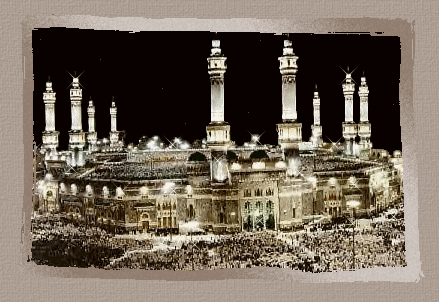|

The Five Pillars of Islam
There's a simple approach to God in the Islam religion. The believer worships God directly without the need for another person like a priest
or rabbi. The Five Pillars of Islam are the basis of their religion and their way of life. They are:
|
Iman, the belief in the Oneness of God (Allah) and that the Prophet Muhammad is the final prophet;
Salah, the five daily prayers;
Zakah, almsgiving or giving to the needy;
Sawm, purification through fasting; and
Hajj or a pilgrimage to Mecca for those who are able.
|

Faith (Iman)
Every Muslim makes a declaration of faith, or Shahadah, that says "There is none worthy of worship except God (Allah) and Muhammad is the
messenger of God." Their belief is that man’s sole purpose in life is to serve and obey God. The Shahadah is the first thing said to a
baby after it is born and the last thing to a person who has died.

Prayer (Salah)
Muslims who practice Islam pray five times a day and believe prayer is their connection to God. Prayer is a personal time between a
person and God. There are no priest, but a person who knows the Qur’an is chosen by the congregation to lead the prayers. Muslims must face
Mecca when saying the prayers. They take on many postures during their prayers: they stand, they incline, they prostrate, they sit. The
prayers are read from the Qur'an and must be said from memory in Arabiyya, the language of the Qur'an. No books may be held during the
prayer time and no other language may be used when reading the prayers from the Qur'an. The prayers are at specific times of day: dawn,
mid-day, late-afternoon, sunset, and nightfall. Before praying, a Muslim will perform a ritual washing to make sure they are clean. The
prayers should be said in a mosque with other Muslims, but a person can pray anywhere. A person can say a prayer on his own at any time in
his own language, but it doesn’t count towards the five mandatory prayer times.
A muezzin calls the Muslims to prayer using a human voice. The Jews use a shofar and the Christians ring bells. The Islam call to prayer in
English is:
God is Great.
God is Great.
God is Great.
God is Great.
I testify that there is none worthy of worship except God.
I testify that there is none worthy of worship except God.
I testify that Muhammad is the messenger of God.
I testify that Muhammad is the messenger of God.
Come to prayer!
Come to prayer!
Come to success!
Come to success!
God is Great!
God is Great!
There is none worthy of worship except God.
|
On Fridays all Muslim men meet together for noon prayer and to listen to a khutba (sermon or teaching) in Arabic by a leader in the community.
During the khutba they pray for their leader. At some times in history and in some communities women have been allowed to join the men,
but they either stand behind them or in a separate section of the building.

Alms (Zakah)
Muslims believe that everything belongs to God and we are just the caretaker of what He gives us. Zakah means purification. It is the duty of
each believer to purify their possessions by giving to the needy. In the Islamic law, the Shari'ah, believers are told to give 2-1/2 percent
of what they own, but some Muslims believe they should give 40% of their possesions as their "sadaqa-h" or voluntary charity.
|
The Prophet said: "Even meeting your brother with a cheerful face is an act of charity. Charity is a necessity for every
Muslim."
He was asked: "What if a person has nothing?"
The Prophet replied: "He should work with his own hands for his benefit and then give something out of such earnings in
charity."
The Companions of the Prophet asked: "What if he is not able to work?"
The Prophet said: "He should help the poor and needy."
The Companions further asked: "What if he cannot do even that?"
The Prophet said: "He should urge others to do good."
The Companions said: "What if he lacks that also?"
The Prophet said: "He should check himself from doing evil. That is also an act of charity."
from Why Islam |

Fasting (Sawm)
During Ramadan, all Muslims fast from dawn until sundown. They are not allowed to eat or drink nor have any relations with their husband or
wife. Fasting is a way the Muslims purify themselves. While they fast and deprive themselves of food, they have a better sense God. It also
teaches them self-restraint. People who are sick, old, pregnant or on a trip do not have to fast but are supposed to fast that many days later
in the year when they are able to. Once a child becomes a teenager, he begins to observe the fast and goes to daily prayers.

Pilgrimage (Hajj)
Every Muslim who is physically and financially able to must make at least one pilgrimage to Mecca in his life time. Every pilgrim wears simple
clothing that doesn't show whether they are wealthy or poor. The pilgrimage takes place every year in the twelfth month of the Islamic year.


The Five Pillars of Faith
Holidays
Holy Book
Bibliography
All About Me


Email
Linkback Graphics from
Rahila's Islamic Graphics |